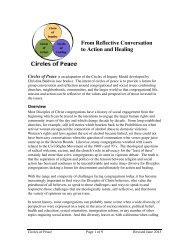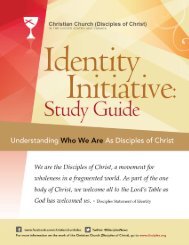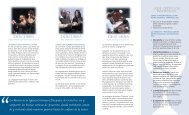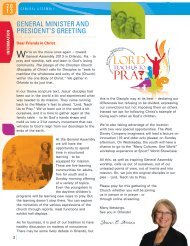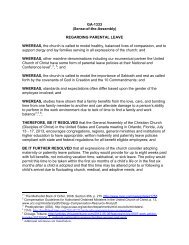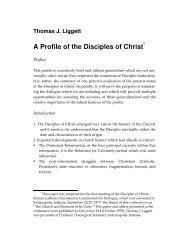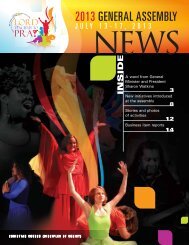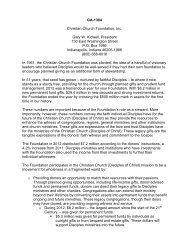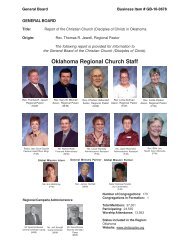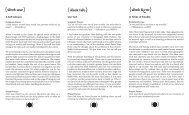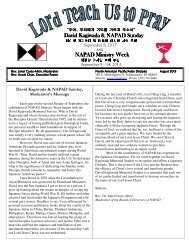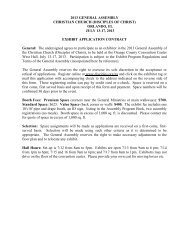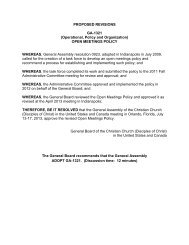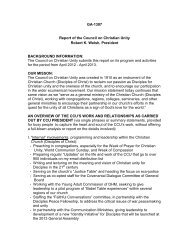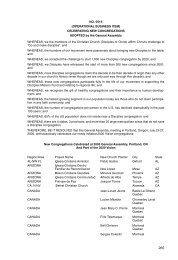RESOURCING THE CHURCH FOR ECUMENICAL MINISTRy A ...
RESOURCING THE CHURCH FOR ECUMENICAL MINISTRy A ...
RESOURCING THE CHURCH FOR ECUMENICAL MINISTRy A ...
Create successful ePaper yourself
Turn your PDF publications into a flip-book with our unique Google optimized e-Paper software.
Balch explains that allophyle is the Greek translation<br />
of Philistine, one who is characterized by LXX as<br />
worshiping idols, uncircumcised, and frequently at<br />
odds with the people of Judea. Balch declares, “he is<br />
baptizing Goliath into the church!” This was an<br />
extraordinary thing for a Jewish believer in the one<br />
crucified under a centurion’s supervision (Luke<br />
23:47) to accept, much less accomplish.<br />
Peter was prepared for his own conversion by the<br />
vision he received in Acts 10:9-16. Peter was<br />
hungry, fell into a trance and watched as a sheet was<br />
lowered with all manner of “unclean” animals. Peter<br />
refused to partake of the unclean animals saying,<br />
“By no means, Lord, for I have never eaten anything<br />
that is profane or unclean” (Acts 10:14). The<br />
response to him was that what God has made clean,<br />
you must not call unclean.<br />
Readers run two great risks in interpreting this<br />
purely in terms of the legal requirement of kosher<br />
food. The first risk is the risk of anti-Semitism.<br />
Christians frequently dismiss “those ritualistic<br />
Jews” who maintain kosher diets. The reasons for<br />
and significance of a kosher diet is someone else’s<br />
holy ground particularly in light of the persecutions<br />
narrated in 2 Maccabees 6-7. The martyrdom of<br />
Eleazor involves meat regarded by Jews as unclean.<br />
Antiochus, the Selucid ruler orders everyone to eat<br />
meat sacrificed to idols and to torture and kill those<br />
who refuse. Among those refusing to eat the meat is<br />
a respected elder, Eleazor. Eleazor gives a speech<br />
stressing the religious significance of refraining to<br />
eat such meat. Antiochus transgressed boundaries; he<br />
did not cross them. And in so-doing he tormented<br />
rather than shared. Refraining from so-called<br />
unclean meat became a powerful sign of identity for<br />
some faithful descendants of Abraham and remains<br />
one to this day. Dismissiveness transgresses<br />
boundaries; it does not cross them.<br />
The second great risk in reading the text in terms of<br />
food is isolating its application on a too literal plain.<br />
The message points Peter to a mission to the<br />
Gentiles. The words katharizo (cleanse) and koinou<br />
(impure, unclean, common or profane) in 10:15 in<br />
reference to animals emerge again at 10:28 in<br />
reference Cornelius’ household. Upon entering<br />
their house, Peter said to them, “You are well aware<br />
that it is against our law for a Jew to associate with a<br />
Gentile or visit him. But God has shown me that I<br />
should not call any person impure or unclean.”<br />
Peter’s culinary dream in 10:9-16 foreshadows the<br />
ecclesiastical reality in chapter 11 as the church<br />
Mangum • Boundary Crossing, Conversion and Resurrection<br />
44<br />
accepts the capacity of non-Jewish people to (1)<br />
receive the message of Christ; (2) receive the Spirit<br />
of Christ; and (3) be baptized.<br />
Through this movement, the church accepts a<br />
reality that changes both its character and<br />
understanding of God. Beverly Gaventa writes, “By<br />
means of the issue of hospitality, Luke demonstrates<br />
that the conversion of the first Gentile required the<br />
conversion of the church as well. Indeed, in Luke’s<br />
account, Peter and company undergo a change that<br />
is more wrenching by far than the change<br />
experienced by Cornelius.” The church had to<br />
convert to this paradigm for itself—Do not regard as<br />
unclean any person God has made, any person God<br />
has loved, any person God has forgiven.<br />
When Peter is confronted by those in Judea for his<br />
actions, he offers a speech giving his account. The<br />
evidence that Peter’s actions were right is lodged<br />
within the presence of the Holy Spirit as seen in the<br />
ecstatic tongues. He concludes his speech, “So if<br />
God gave them the same gift as he gave us, who<br />
believed in the Lord Jesus Christ, who was I to think<br />
that I could oppose God!” (11:17). To which the<br />
people respond, “So then God has even granted the<br />
Gentile repentance unto life” (11:18).<br />
And so Peter’s speech signals his own conversion<br />
toward accepting Gentiles, and indeed the church’s<br />
conversion, on this point by saying, “Now I<br />
understand.” Sometimes we read such statements<br />
through the lens of contemporary shtick. “Now I<br />
understand . . . ” Sometimes contemporary<br />
preachers treat Peter and Paul like the Laurel and<br />
Hardy of the New Testament. They satirize one as<br />
slow witted and the other as quick tempered. How<br />
many sermons have we heard—and perhaps even<br />
preached—when the preacher reached this point in<br />
the story, rolled his or her eyes and said, “Oh, now<br />
you get it Peter. Took you long enough.” Preachers<br />
often fail to acknowledge the tremendous change<br />
that was underway within the world. Peter and the<br />
early church were the first to witness the<br />
momentous shift in human history. They were the<br />
first to try to make sense of it. They deserve credit<br />
for hanging onto that bull for the full eight seconds.<br />
As the focus is shifted to a contemporary setting, the<br />
church repeatedly encounters boundaries the<br />
gospel compels us to cross. The church repeatedly<br />
must convert to accept a new reality. For millennia<br />
the church regarded slavery as acceptable, but then<br />
it converted. Then for a century the church



